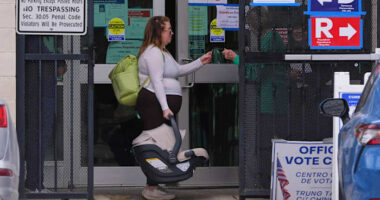Share this @internewscast.com

AUSTIN (KXAN) Texas faces another lawsuit from the American Civil Liberties Union (ACLU) over a new state law, according to a press release from the civil rights organization.
Senate Bill 12, which Texas Gov. Greg Abbott signed Sunday, takes effect in September. It is an omnibus of school-related rules applicable to public schools and open-enrollment charter schools, primarily focused on “parental rights.”
ACLU of Texas Senior Staff Attorney Brian Klosterboer called SB 12 “discriminatory” in the lawsuit’s announcement, which said that the ACLU will be joined by a “coalition of Texans whose constitutional rights are harmed by this new law.”
“We’re taking legal action to challenge this discriminatory law and reaffirm that all students should have access to a safe, inclusive education that prepares them for their futures in our diverse state, no exceptions.”
A lead member of the lawsuit’s coalition is a students’ rights group, Students Engaged in Advancing Texas, or SEAT.
SEAT Executive Director Cameron Samuels said that SB 12 “seeks to erase students’ identities” and force teachers and volunteers to lie “about the history and diversity of our state.”
“State leaders have been in the business of manufacturing problems that don’t exist – such as stoking fear against Diversity, Equity, and Inclusion (DEI) – to ignore the solutions that students need and deserve,” they said.
What parts of SB 12 will they sue over?
While the lawsuit hasn’t been filed, the press release mentioned several parts of SB 12:
- DEI ban: No referencing race, color, ethnicity, gender identity or sexual orientation in hiring, policies, trainings, activities, procedures or programs (unless required by law or in service of recruiting students for historically Black universities);
- No social transition support: School staff can’t provide info about social gender transition, nor can they use a student’s preferred name, pronouns or “other expressions of gender that deny … biological sex at birth”;
- LGBTQ+ clubs ban: Districts are not allowed to authorize or sponsor student groups based on sexual orientation or gender identity.
Samuels criticized the state legislature for not listening to or including students while making laws like SB 12.
“Barring student organizations and teachers from supporting LGBTQIA young people, particularly trans and nonbinary students, is inflicting even more harm and making our schools unsafe and unjust,” they said. “As students, Texas must not exclude us from the narrative or decision-making in curricula. We are here to ensure that inclusive public education is a cornerstone to our state’s pluralistic and multicultural democracy.”
Klosterboer said in the release that SB 12 “harms Texas schools by shutting down important discussions and programs.”
“Students should be free to learn about themselves and the world around them, but SB 12 aims to punish kids for being who they are and ban teachers from supporting them. It sends the false message that Black, Brown, LGBTQIA, and other students don’t belong in the classroom or in our state,” Klosterboer said.
‘Parental rights’ expanded
The core thrust of SB 12 is built around “parental rights.” It establishes that parents have a “right to direct the moral and religious training of the parent’s child, make decisions concerning the child’s education, and consent to medical, psychiatric, and psychological treatment of the child without obstruction or interference from this state.”
School staff will not be allowed to withhold any information about a child from that child’s parent, unless required by another law. That info also includes medical records and library materials checked out by their student.
If an employee suspects a crime happened against a student, the student’s parents must be notified within a day.
Each year, schools will need to notify parents about and allow them to exempt their children from specific instruction or activities, including:
- course of study and supplemental services;
- instructional materials and library materials;
- health education instruction;
- instruction regarding sexual orientation and gender identity;
- school options, including virtual and remote schooling options;
- immunizations;
- gifted and talented programs;
- promotion, retention, and graduation policies;
- grade, class rank, and attendance information;
- state standards and requirements;
- data collection practices;
- health care services, including notice and consent;
- authorized student clubs;
- the grievance procedure related to SB 12; and
- special education and bilingual education and special language programs.
A parent’s consent will be required for any psychological/psychiatrics test or treatment. Schools will not be allowed to collect or store any student’s biometric data — fingerprints, DNA, face scan, etc.
All of these elements describe forms to be provided to parents at the start of the academic year. Parents will also be able to submit grievances to the board if they suspect violations of those consent forms or other SB 12 policies.
Change to school districts, boards
Each school district is required to create a grievance policy that meets SB 12’s standards. One of those criteria is that it should be easy to access and initiate the grievance policy.
If a district has at least five grievances in a year, its superintendent will have to testify before the State Board of Education.
The other side of the grievance process is that districts will also be required to update termination policies to include breeches of SB 12’s provisions.
Board meetings will also change under SB 12. Districts will have to have a way for parents to submit public comments online, and public comments will have to happen near the start of board meetings. Also, board meetings will need to be held outside of “typical work hours.”
Districts will need to create an annual “facility usage report” detailing: Square footage and acreage of each property, total student capacity of instructional facilities, enrollment count and capacity of each campus, the usage of each facility and whether the district owns or leases the property. That report must be available online and produced each year.
Other changes include a requirement that school boards must update its webpages to reflect the current trustees within 30 days after they are sworn in, and parent-teacher conferences will need to be provided at least twice a year.











